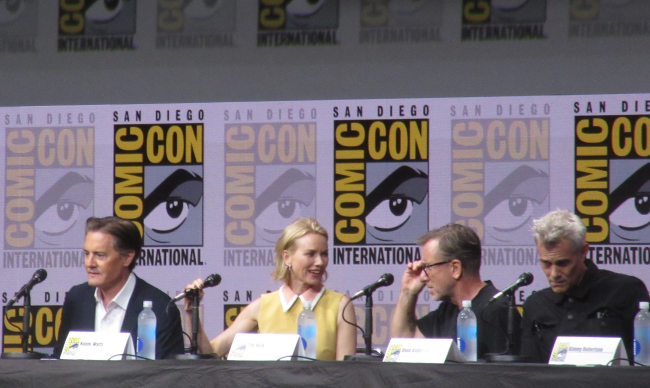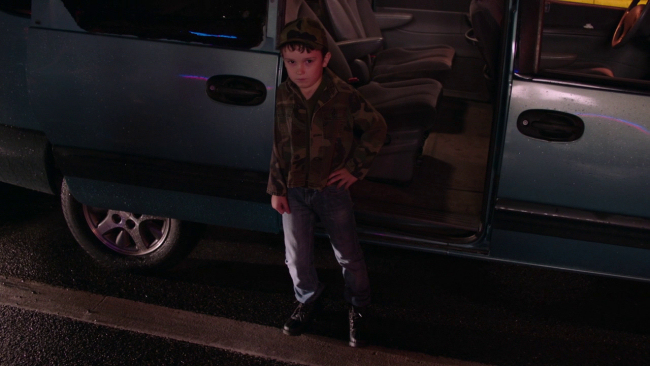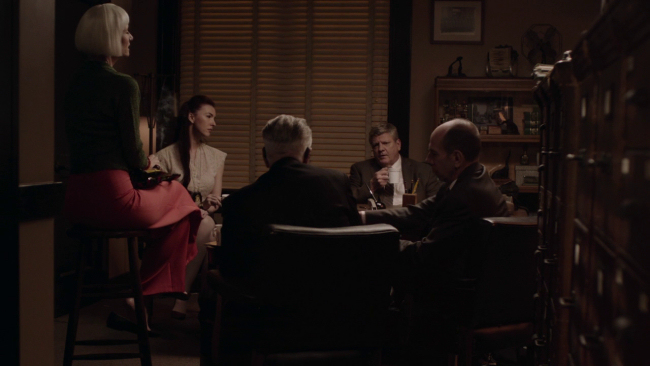
One of the episodes most satisfyingly reminiscent of the first two seasons, last night's Twin Peaks, "There's Fire Where You're Going", also continued Lynch's discussion of the relationship between violence and children. It also showed how the forces for good are slow, misdirected, and mysterious, sometimes tragically so. I saw the episode on Friday at a screening at Comic Con--David Lynch had requested that no-one in the audience discuss the episode on social media until after it had aired and I was certainly willing to take direction from him. All the same, I'm glad I can talk about it now.

I'd caught the panel for Twin Peaks in Hall H on Friday afternoon, despite knowing most of it would likely end up on YouTube anyway, which it has:
My favourite moment is in around 20:10 in the second video where Everett McGill talks about Lynch's "sharp edge" after everyone else had been talking about how warm and comfortable the experience of working with Lynch is.
There are a couple things not in the videos, though. The panel was moderated by Damon Lindelof, the creator of The Leftovers and co-creator of Lost. It's unusual to see someone like Lindelof moderate a panel, which in itself speaks to the nature of Twin Peaks' influence, but to make it even clearer, Lindelof began with a speech in which he listed off the variety of great television shows, mentioning The X-Files, True Detective, The Sopranos, and Stranger Things among others, that wouldn't exist without Twin Peaks, concluding by saying that Lost would most certainly not have existed if not for Twin Peaks.
After this, a video David Lynch recorded for the panel was shown. It looked like it was filmed at the same time as his promos for the Japanese station, Wowow, that's airing Twin Peaks in Japan--Lynch sitting, talking to the camera with a black background. But this was much longer than the Wowow promo with Lynch pretending to do multiple takes of his Comic Con message, each time getting interrupted by something absurd--a man off camera jumping out of the window, someone evidently riding into the room on a horse. It was a funny video in an anachronistically corny way but also slightly disturbing. I'm glad I saw it.

When I found out that there was going to be a screening that night at 10pm of episode 11, two days before it aired, I wasn't sure I wanted to go. Did seeing it two days early really matter and did I really want to see it in a crowded room with uncontrolled potential distractions? Not to mention I had left my apartment at 7:30am and leaving Comic Con at 11pm meant I wouldn't get home until at least 1am. But I finally decided I wanted the experience of seeing an episode of the new series with an audience of fans reacting to it for the first time. Apparently David Lynch thought the same thing because we were informed that he was watching us watching the show. I suppose there hasn't been a screening for the show since Cannes and this would be Lynch's chance to gauge the reaction of a completely different kind of audience.

The screening started a few minutes late because some "talent", we were informed, were unable to get into the building. It being so late, a lot of doors were evidently locked. But finally we were surprised to see walking into the room Kimmy Robertson, Everett McGill, James Marshall, and Don Murray who plays Bushnell Mullins on the new series, Dougie's boss. Before they arrived, I found myself in agreement with someone I overheard sitting behind me who said he hoped people would avoid too much cheering or applause during the episode. But as it turned out, I felt really good when the audience broke out into applause when Don Murray appeared on screen, doing little push-ups on his desk. It must have felt good for him to hear that.

None of the surprise guests spoke except a woman whose name I didn't catch who told us that she had just face timed with Lynch, informing us that Lynch could see us, and saying that Lynch had instructed her to recite a poem and asked those of us who could to speak it along with her. I wish I'd had more memory left on my camera by that point to get more than this brief clip:
She started it quickly but many people in the room did catch up and start saying it along with her.
I felt sort of worried that people were going to laugh at the wrong moments during the screening and I hoped people wouldn't respond in a way that would disappoint Lynch. The screening was held in Room 6A, one of the larger rooms upstairs and I sat through several panels before it. Any asshole could've walked in but the Con crowd is generally pretty cool and civil to one another. That and the fact that it was held so late, I think, ensured that it was a screening blessedly free of distraction. "There's Fire Where You are Going" turned out to be a particularly good episode for the occasion, featuring as it did several crowd-pleasing moments.
Spoilers after the screenshot

The episode begins with a rather old fashioned scene of three little boys playing catch. One of them is older than the other two and seems to be using his higher rank responsibly, encouraging the other two, complementing a successful catch and saying it was okay when a catch was missed. When he ran out into the street to get the ball, worried sounds from people in the screening audience told me everyone was thinking he was going to get hit by a car. But instead we see Miriam (Sarah Jean Long) who has managed to survive her encounter with Richard and crawl away. The sweet pie lover from the RR now looks pretty horrific.

I guess she doesn't have a phone--this would explain why she chose to report Richard via letter and why she couldn't call for help. Why doesn't she have a phone? Why can't Cooper (Kyle MacLachlan) wake up? The paths to safety and effectiveness are mysteriously blocked.

Except Dougie seems to be getting by on pure instinct. When Dougie's meet up with the Mitchum brothers concluded in the desert with Rodney (Robert Knepper) and Bradley (Jim Belushi) ecstatic over the 30 million dollar check, the audience applauded widely and it occurred to me how the episode was broken down into little stories and how masterfully Lynch orchestrates the telling of them with sound and editing. Dialogue, too, but I think what Twin Peaks is showing is how many aspects of cinematic storytelling are being neglected for the fact that the star of this modern age of television tends to be the writer. I can see this being related to the joy in experiencing Twin Peaks without the spoilers of trailers and synopses--audiences who are used to getting all the material via language might see little difference between getting the description of an episode plot from Wikipedia and actually experiencing the episode itself. Obviously I'm a great lover of writing but Twin Peaks is highlighting the other methods of storytelling.

The episode features two instances of guns being fired but failing to harm or kill--Becky (Amanda Seyfried) firing a gun into the apartment of Donna's sister, Gersten (Alicia Witt), and the little boy who finds a gun in his parents' car and fires off two shots. Where the first seasons of Twin Peaks began with the horror of a child murdered by an adult, Lynch is now writing for a world where the horror often comes from the fact that kids are murdering kids. Neither Becky or the little boy ought to have had access to a firearm, I think that much is clear.

The one point where I felt like the audience had an inappropriate reaction was when they laughed at this shot of the little boy. I think Lynch meant for it to be a little more disturbing though I think laughter is sometimes provoked by nervousness and fear. Lynch tellingly juxtaposes the kid with his father, both looking like hunters in their camoflage--or one could say woodsmen.
This sequence, beginning to end, is in itself a masterpiece. From where it starts in the diner to where it ends with the sick girl in the car, Lynch strings along surprising pieces of information with the instincts of a great orchestra conducter. I want to point out again how much mileage he gets from the briefest shots of Peggy Lipton.

This actress has become a genius at communicating with subtle facial expressions. I'd also be surprised if Dana Ashbrook doesn't get a lot of phone calls for cop roles after this.

We finally get filled in on the details of the new Briggs family dynamics and we see Shelly (Madchen Amick) has once again fallen for a bad boy, Red (Balthazar Getty), though he seems to be a lot worse than Bobby ever was. It was nice to see the brief look of sympathy Becky gives to Bobby, as was her sudden realisation that she'd very nearly killed her mother in one of the show's most effective stunt sequences.

Becky does love her parents and, like Shelly's love for Red, Becky's love for Steven (Caleb Landry Jones) seems misguided though one is given pause when one considers the same might have been said for Shelly's love for Bobby in the original series. Like those gunshots, things never seem to hit the mark.

And I can talk about all this and I still haven't mentioned Gordon's (David Lynch) encounter with the woodsmen and the death of William Hastings (Matthew Lillard). That was wonderfully done and I loved the compositions in the police station afterwards--I mean, jeez, look at this, where do you see anything like this in film or television?

Laura Dern is making Diane a strange and beautiful femme fatale.
And after all this greatness, the episode ends with a scene that might be the best of all, the Mitchum Brothers and Dougie dining on cherry pie and champagne with the piano tune that magically switches from heartbroken to mysterious and playful at just the right moments. I loved how Candie (Amy Shiels) seemed about to break into a song about the traffic on the strip.

Seeing her with Dougie, and their similarly spaced out personalities, made me feel more and more that, if the question this season is "Who is Laura Palmer," my money is on Candie.
Twitter Sonnet #1016
In future darkness dreams of pie await.
In space magicians long to see a play.
Between two worlds of dawn and night we ate.
In steady step with fire I assay.
In dough began the sign of coffee smoke.
In dreams the special box directs the heat.
Tobacco dragons saw the fated stroke.
Forensic cats ascend the hotter seat.
In turning skies the stairs descend on Earth.
In barrels ev'rywhere the shots'll miss.
Beneath enclosing air's encrusted worth.
A fighting bull awaits in quiet bliss.
The lights on asphalt crashed into the toad.
Electric stones begin to burn the road.

No comments:
Post a Comment